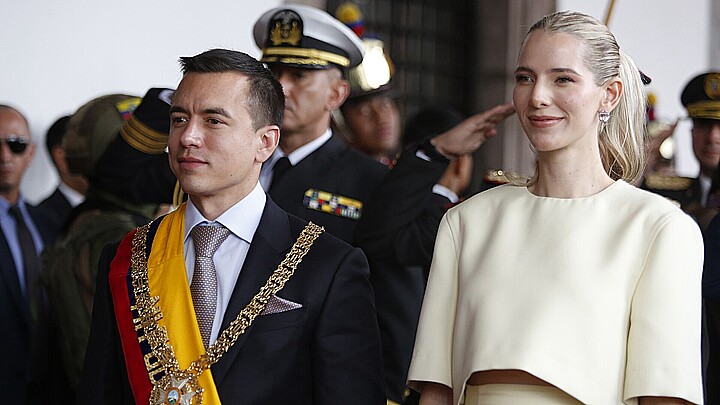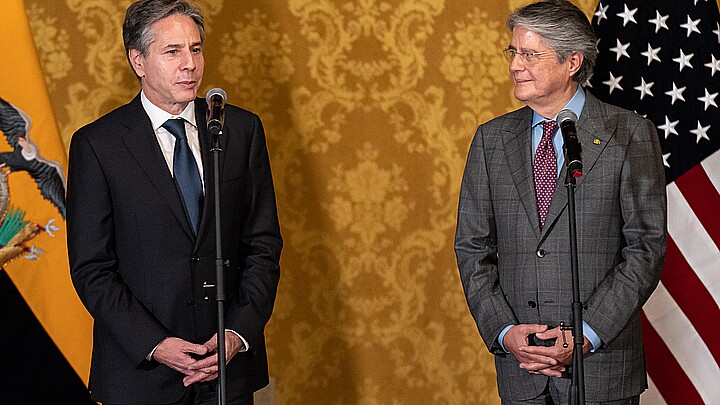Opinion & Reviews
Rebranding Socialism: São Paulo Forum and Puebla Group are a double threat to Latin American democracy
How the Latin American left has hijacked words like "democracy" and "social justice" to manipulate the public into supporting its Marxist agenda.
January 9, 2022 10:38pm
Updated: January 10, 2022 8:31am
The São Paulo Forum (FSP) is an international conference founded in 1990 by Fidel Castro and Lula da Silva, made up of more than 100 organizations and political parties, seeking to recover lost ground in the fight for Marxism ever since the collapse of the Berlin Wall. Although the conference’s original purpose was to recover the lost ground of socialism in Eastern Europe, many of its member groups are linked to Latin American Marxism, and Its latest conference was held in Caracas, Venezuela in July 2019.
Throughout its history, FSP membership has included the terrorist and narco-terrorist organizations such as the Chilean MIR, Sendero Luminoso, and FARC; dictatorial parties such as the Cuban Communist Party, Venezuelan PSUV, Nicaraguan FSLN (Sandinistas), and extreme left parties throughout the continent.
Some analysts and journalists have suggested the São Paulo Forum lacks relevance. However, in 2008, all South American countries except Colombia were in the hands of left or extreme left governments linked to one or more organizations working within the conference. During those years there was an apparent coordinated foreign policy between the group's member countries.
Tensions throughout the 21st century have drawn the international support of the forces of the São Paulo Forum. 2008, after the Colombian army conducted a raid against the FARC, which killed one of its most charismatic leaders, Raul Reyes, the conference helped suppress files linking Hugo Chavez to FARC. The confusion eventually erupted into a diplomatic crisis between Ecuador and Colombia.
Another example of the São Paulo Forum's modus operandi was the condemnation of the impeachment of Paraguayan President Fernando Lugo by the country’s Congress in 2012. Lugo, who identified with leftist ideas also admittedly, closely followed Hugo Chavez’s Venezuelan presidency. Upon his impeachment by Congress, Paraguay suddenly found itself isolated after being suspended by the Union of South American Countries (UNASUR). Upon its expulsion, Venezuela was instead welcomed into the union instead.
The same happened in Honduran President Manuel Zelaya, who had attempted to amend the country’s Constitution but was prevented from doing so by the Constitutional Court. On that occasion, Zelaya alleged that he had been the victim of a coup, and an alternative self-serving, politicized narrative of a ‘coup version’ pushed by Latin American socialists prevailed.
The academic or media sectors that minimize the importance of this conference of organizations are unaware of the degree of political articulation required for the functioning of an international forum that includes more than 100 parties of the left throughout the continent. They also ignore that the direct influence on the international political agenda of all Latin American countries can only be explained by malice. How can a forum that has had at its disposal dozens of presidents and a whole party structure be irrelevant?
Former Brazilian President Lula da Silva publicly admitted the importance of the São Paulo Forum to carry out the left’s message throughout South America, José Dirceu, one of the main cadres of Lula’s party, Brazil’s Worker’s Party (PT) (and trained by Cuban intelligence), stressed the importance of the FSP for the hegemony of the left in the 2000s.
Currently, the São Paulo Forum is gaining strength under a new guise more in line with the new times. The name of this new political instrument is Grupo Puebla. This group, founded in 2019 in Puebla, Mexico, is not really a competitor, but strategically developing new methods on how to defend the old socialism and a Marxist agenda.
The São Paulo Forum had its theoretical background marked by clichés such as: "Fight against neoliberalism", "Fight against Yankee imperialism", typical of "21st-century socialism" and Chavism. The Puebla Group welcomes many actors of the São Paulo Forum who now seek to distance themselves from Chavism and Castroism as electorally negative options, but who also indirectly support these radical groups.
The Puebla Group uses terminology that speaks of "democracy" "fights against fascism" and combats racial and sexual identity guidelines. But in reality, the defense of democracy is just a disguise to promote socialism.
The goal is to expand the notion of "rights" to whatever they themselves decide to do, and which will then have to be paid for with everyone's taxes in a more expensive and inefficient way. The Puebla Group, although it does not completely abandon the old proletarian agendas, identifies today with the guidelines of the New Left, set out in "The Black Book of the New Left" by Agustín Laje and Nicolás Márquez.
However, in no way should we believe that this new group will deny support to its partners in the São Paulo Forum. The Puebla Group bets on the strategy of generating "democratic dialogues" with the objective of guaranteeing the survival of totalitarian regimes such as the Venezuelan, Cuban and Nicaraguan ones.
What are the main actions carried out in the continent by the parties linked to the São Paulo Forum and the Puebla Group?
There are at least five major actions undertaken by the revolutionary parties and sects in Latin America to attract attention, dissipated molecular revolution, new constitution by plebiscite, use of judicial means and "lawfare," control of the media and regulation of social networks and links with organized crime and drug trafficking.
The dissipated molecular revolution is a revolutionary strategy created by the French philosopher Félix Guattari and whose mode of action differs fundamentally from traditional revolutions, such as those carried out by Lenin or Fidel Castro in the 20th century, which concentrated political action in a single party and leadership.
The molecular strategy applies to a multitude of groups acting more or less independently to create a revolutionary environment. The strategy of creating chaos from the demonstrations against the increase in transportation prices in 2019 generated positive results for the socialists in Chile. It was those dynamics that created the enabling environment for the creation of a constitution with a majority presence of left and extreme left actors that will define the future Chilean Magna Carta. This was also attempted in Colombia, but without achieving the political and constitutional victory the left obtained in Chile.
Another strategy is to create a new constitution based on a ‘plebiscite’, which allows a vote by referendum. Manuel Zelaya tried this unsuccessfully in 2009, but now his wife Xiomara Castro promises to carry out a plebiscite to create a new constitution in Honduras that will put an end to the "neoliberal and fascist" legacy of the current constitution.
Hugo Chávez was another leading member of the São Paulo Forum, extremely adept at implementing this type of change once in power. He rose through the electoral process and undermined democratic institutions until his party's hegemony was achieved. At the same time, he held plebiscites to legitimize his revolutionary and socialist actions.
The third macro-strategy of the members of the São Paulo Forum consists of using justice for their own objectives, or accusing the courts that act contrary to their interests of "lawfare".
Examples of this strategy are Brazil, Argentina, and Bolivia.
Lula da Silva was convicted and imprisoned in courts of first and second instance, even with the initial endorsement of the Brazilian Supreme Court. Brazil's Workers' Party insists that Lula has been convicted without evidence, even though the evidence against him was solid. Later, Lula would succeed in reversing his arrest by legal maneuvers within the Supreme Court, which has a majority of PT-appointed judges.
In Argentina, Cristina Kirchner was indicted for the so-called "corruption notebooks" in which she allegedly moved $200 million USD in bribes. She denied this and other accusations and claimed that she was being persecuted by the "Warfare" (or war through the judiciary). In Bolivia, as soon as Luis Arce Catacora and his party returned to power, they began arresting their opponents in record time, particularly former president Jeanine Añez.
Another relevant strategy used by allies of the São Paulo Forum and the Puebla Group is the control of the media and the regulation of social networks. The most abominable case is that of the Cuban dictatorship, which ranks 171 out of 180 countries in the Reporters Without Borders freedom of expression index.
According to the free press organization, independent journalists in Cuba are harassed by the Castro government's thought police. The Sandinista dictatorship in Nicaragua persecutes opposition newspapers such as "La Prensa," and in Brazil, former President Lula da Silva repeatedly speaks of regulating (controlling) the press.
Finally, one of the strategies of the allied countries of the São Paulo Forum and the Puebla Group is the relationship between organized crime and drug trafficking. Intelligence agents of the Cuban regime have been accused of drug trafficking since the 1980s in Florida courts in the United States. One emblematic case that demonstrates this fact is the arrest and summary execution of Angolan war hero General Arnaldo Ochoa, who was indicted and executed by the Castro regime after being convicted drug trafficking charges in 1989 despite the regime being the driving force behind the trafficking efforts.
All this information may be found in the following books: Red Cocaine: The Drugging of America, by Joseph Douglass; Hugo Chávez: The Specter, by Leonardo Coutinho, and Cuba's Intervention in Venezuela: A Strategic Occupation with Global Repercussions, by Maria Werlau.
The Chávez regime in Venezuela is another clear example of this strategy. Investigative journalist Maibort Petit writes in her book Cocaína en Miraflores: Crónica del narcopoder en Venezuela, that the Venezuelan government has close relations with drug traffickers, which includes utilization of the Venezuelan army.
The Insight Crime website also has extensive documentation on Venezuela's Cartel of the Suns. The ultimate example of the use of this strategy was the legalization of the FARC as a political party, having barely given up drug trafficking routes. Even congressmen who participated in drug trafficking were elected and formally took office in the Colombian Congress.
This list is not intended to be exhaustive, but rather to provide an overview of the actions and strategies of the Sâo Paulo Forum and the Puebla Group and notify the public on the dangers they present to both Central and South America throughout the Western Hemisphere.









